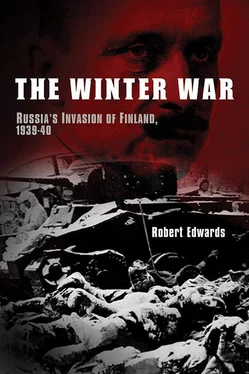The diplomatic pressure now shifted ground. Given that the Finns had already rejected the Soviet proposals concerning the Åland matter, in January 1939 Cajander, Erkko and Tanner travelled to Stockholm to sign the revised 1921 convention with the Swedes. This was a significant moment in the execution of a policy of Fenno-Swedish collective security and the Russians tried very hard to sabotage it. Because the convention was a League of Nations matter, it required the approval of all those who had signed the original 1921 agreement, which did not, of course, include Moscow. None the less, as soon as the news broke that British and French approval was now being sought, the Soviet ambassadors in both London and Paris urged delay upon the British and French governments, citing a secret agreement between Finland and Germany that in time of war the Åland archipelago was to be placed at the disposal of the Kriegsmarine. Ominously, the same story appeared in the last week of January in Krasnaya Zvezda (Red Star), the official Red Army newspaper. The crude disinformation worked, eliciting the response to the Fenno-Swedish démarche in both capitals that presumably the Russians would find the new arrangements for the militarization of the Ålands agreeable? Otherwise…
Under certain well-defined circumstances, they might. The lure of a trade agreement was once again used and, perhaps naively, a Finnish delegation obligingly appeared in Moscow—and waited. As they drummed their fingers in expectation, another face appeared in Erkko’s office—this was one Boris Stein, who had been a predecessor of Deravianski’s as ambassador to Helsinki. He had contrived to be ‘passing through’ as part of a rest cure—the media reported that he had been ill.
With a variation on the well-worn theme, Stein suggested that the island of Suursaari (Hogland) be leased for thirty years by the Soviet Union, together with four others in the eastern Gulf of Finland, all of which had been demilitarized by the Treaty of Tartu. In return, territory in Soviet eastern Karelia was to be offered in compensation. The familiar issue, the security of Leningrad and Kronstadt, in the event of German aggression, was cited. As Stein proposed in Helsinki, so too did Litvinov to Yrjö-Koskinen in Moscow.
This time, however, there was a difference. Erkko actually told Mannerheim what was happening—the Marshal had been rather kept out of the information loop during the Yartsev approaches, and what he now heard, that the Cabinet was not disposed to discuss Stein and Litvinov’s proposition, quite appalled him. He urged concessions; Stein must not return to Moscow empty-handed. The islands in question were of little value to Finland and could not be used for offensive action against her, or even if they could they were of no more use than any other point along the 800-mile border. To lease the islands to the Soviets, he maintained, would pacify them and go a long way to address the serious issue of the security of Leningrad—a constant niggle which had surely driven Russian Baltic policy for over two centuries.
As soon as the terrifying implications of Moscow’s demands were revealed by an embarrassed Cabinet to an incredulous commander-in-chief in waiting, Mannerheim’s counsel was straightforward; given that the task of actually fighting the Russians was at present completely beyond the abilities of the Finnish Army (as he had already reported in the wake of the crisis after Munich), then negotiation was the only realistic option. To his consternation, the Cabinet viewed the matter rather differently—Cajander’s view, that any government which offered territorial concessions to the Soviet Union would undoubtedly be ejected from power, did not impress the Marshal, whose opinion of political parties, as a clearly committed public servant (whatever his previous private agenda), was gloomy at best.
Once again, he found himself a voice in the wilderness; the Cabinet seemed to view the situation with a Zen-like calm, which was not justified by the brutal realities of what it was facing. The assumption, which the members of the Cabinet collectively made, that Russian demands were an opening gambit in a prolonged haggle, was essentially false, but it would take them vital months to arrive at that conclusion. As for Mannerheim’s dissent, his well-known dislike of Communism, coupled with his uncomfortable Russian past made him an object of a certain amount of naive suspicion. But the core misunderstanding on the part of Cajander’s Cabinet was that it could negotiate with Moscow as an equal.
It was no particular secret, at least at the political level, that Marshal Mannerheim and Prime Minister Cajander did not necessarily find each other congenial, which may well be why they met so infrequently. Cajander was possessed of those immaculately liberal urban instincts, which can often display themselves as a mistrust of the military and all its ‘toys’. Cajander had refused, serially, to admit that Finland was in any particular danger. The cloak of neutrality was enough, he maintained. Mannerheim thought him a purblind ass, an opinion probably reinforced by a series of ill-advised speeches which the Prime Minister was unwise enough to make, the first of them after the Molotov-Ribbentrop pact was signed—he jokingly congratulated the Finnish Army on not having received any new weapons: ‘They would be rusty and obsolete by now!’ Nobody laughed.
Cajander’s handling of the diplomatic crisis with Moscow had been characterized by a singular lack of imagination. That fatal lack of vision, an inability to calculate what might go wrong if one is not careful, was coupled with a complete misappreciation of either Soviet needs or indeed Soviet intentions.
Adolf Hitler had not made the same mistake. Just as his policy had been the creation of a greater Germany, so he intuitively understood that the Kremlin’s policy was the geographical recreation of the Tsarist state; not merely the state of Tsar Nicholas, but the state of Tsar Peter, with borders in the west roughly defined in historical terms by the year 1721. There was no room in this plan for an independent Finland, autonomous Grand Duchy or not. Mannerheim and his circle realized that, for they had a greater strategic understanding of what Russia’s security needs were than did the Finnish government.
The Tsarist state had been carefully assembled, particularly in the context of the Baltic. It had long been appreciated that the City of St Peter could only be protected by control of both sides of the Gulf of Finland as it narrowed to become what were now the roads of the City of St Lenin. That imperative had grown and matured as technology improved to the point where a capital ship could shell Leningrad at will or, more critically, modern artillery parked on the Karelian Isthmus could also do the same. The fact that Finland had no artillery to speak of was irrelevant, as it was a lack which could be surely filled with ease.
In the context of the Baltic states, then, this was the essence of the territorial aspect of the Molotov pact. In a secret annexe to the pact, the southern Baltic states of Estonia and Latvia (and, later Lithuania) were consigned to the Soviet sphere of influence and so, crucially, was Finland. In this way Germany could accommodate the Kremlin’s imperial needs, and even pretend that the reason was to protect Leningrad from the Royal Navy from the sea, rather than the Wehrmacht on land. In Finland, the importance of this unlikely alliance was regarded along predictably party lines. Liberal interpretations of it concluded that Finland’s undeniable prosperity—the success of the whole project—had made the country indispensable as a model social democracy; the world needed it as a neutral beacon of hope in a chaotic world. Others, Mannerheim included, felt that fine and splendid though this dizzying success was, it could all prove to be purely temporary if the Russians were not dealt with very carefully indeed; and, clearly, they had not been.
Читать дальше











